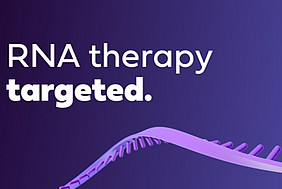The start-up rnatics of the Technical University of Munich (TUM) has developed an RNA-based active substance against inflammatory lung damage resulting from severe COVID-19 courses. The German Federal Ministry of Education and Research (BMBF) is now supporting the further development of the drug with 7 million euros. The rnatics team is focusing on a substance that blocks a pro-inflammatory microRNA. Moreover, the approach is virus variant-independent.
Severe inflammation and scarring of the lung tissue are possible consequences of SARS-CoV2 infections. They can limit lung function in the long term and are one of the causes of the "long covid" phenomenon. A team led by Stefan Engelhardt, Professor of Pharmacology and Toxicology at TUM, has now developed a new RNA agent that can prevent this inflammatory lung damage.
Active ingredient specifically inhibits microRNA in macrophages
To this end, the active ingredient inhibits a specific microRNA in macrophages of the lung, which promotes the inflammatory process and occurs in very high concentrations in the lungs of COVID-19 sufferers.
In the mouse model, it has already been shown that the new active substance specifically blocks the microRNA molecule. As a result, there was significantly less inflammation and lung damage, and lung function clearly improved. Prof. Stefan Engelhardt is confident that serious inflammation and ultimately lung damage can also be prevented in people who inhale the active substance via an inhaler in Long Covid.
The therapeutic is based on the active ingredient RCS-21, a novel ligand-coupled oligonucleotide inhibitor. The RNA drug would be the first in its drug class to be targeted to macrophages. "By affecting immune cells rather than the virus, RCS-21 should also be effective against diseases caused by Omicron or future, more aggressive viral variants," says Dr. Deepak Ramanujam, co-inventor and group leader at the Institute of Pharmacology and Toxicology. A worldwide patenting process is underway.
The German Federal Ministry of Education and Research (BMBF) will fund clinical trials for the drug with 7 million euros as part of the "Guideline for the Promotion of Research and Development of Urgently Needed Therapeutics against SARS-CoV-2."
The aim of the funding guideline is to strengthen the clinical development of promising therapeutic approaches against COVID-19. The BMBF published the first call for the funding measure in January 2021, and is now providing an additional €24.3 million to fund three additional projects under the new guideline, which was relaunched on June 14, 2021.
In addition, the Federal Institute for Drugs and Medical Devices (BfArM) has given a positive assessment for the active substance RCS-21 in a so-called advice meeting - an important condition for the final development of a drug. "We expect to be able to complete the preclinical toxicological evaluation in the third quarter of 2022," he said. If the BfArM gives approval, we can enter clinical trials in about a year," Engelhardt explains.
Crucial support from TUM Venture Lab Healthcare
With the support of TUM Venture Labs Healthcare, the start-up rnatics was able to be spun out in a very short time and meet the necessary preconditions for the development of a drug. Co-founders are the experienced biotechnology entrepreneur and investor Dr. Thomas Frischmuth and Prof. Klaus Rabe, Director of the Lung Clinic Hamburg/Großhansdorf and expert in the field of therapy development for lung diseases. ISAR Bioscience GmbH is also involved in the development of RCS-21.
The TUM Venture Lab Healthcare is part of the TUM Venture Labs initiative for start-ups from research, which is unique in Europe. The goal is to drastically accelerate the translation of cutting-edge research into marketable applications. TUM Venture Labs offers customized training and venturing programs, incubation space, and access to global networks of experts and investors.
For more information, visit: www.rnatics.com and www.linkedin.com/company/rnatics
Funding also for Proteo Biotech and Evotec
Along with rnatics, Kiel-based Proteo Biotech AG also received BMBF funding for research into a protein for the treatment of severe COVID-19 disease, and Evotec International GmbH for conducting a clinical Phase 1 and 2a to demonstrate the safety and efficacy of a novel immunomodulatory molecule in COVID-19 patients. In Martinsried, Evotec operates a site with approximately 50 employees focusing on proteomics, biomarker and metabolomics services.

